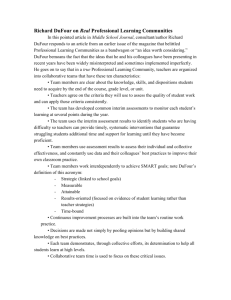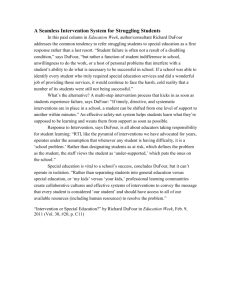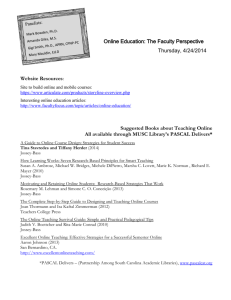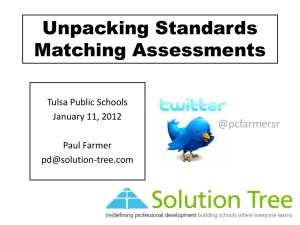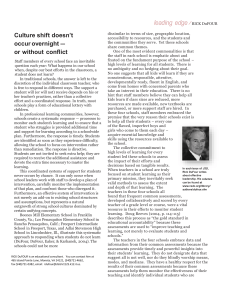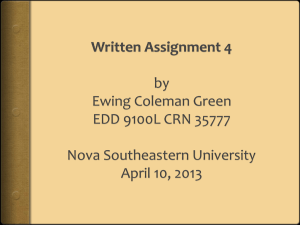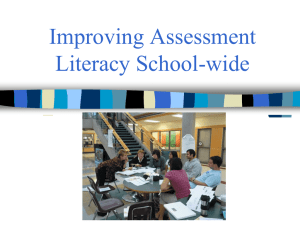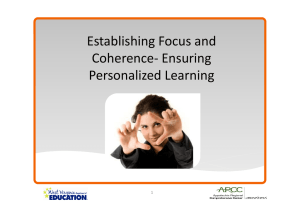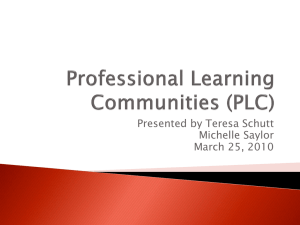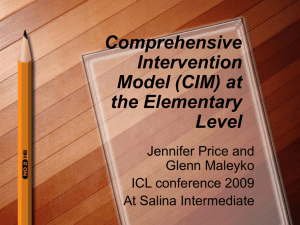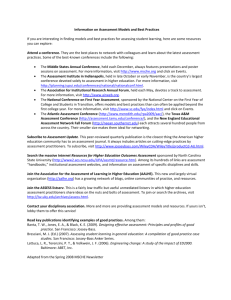851.705.9M- Covington McBride - Center for Technology in Education
advertisement
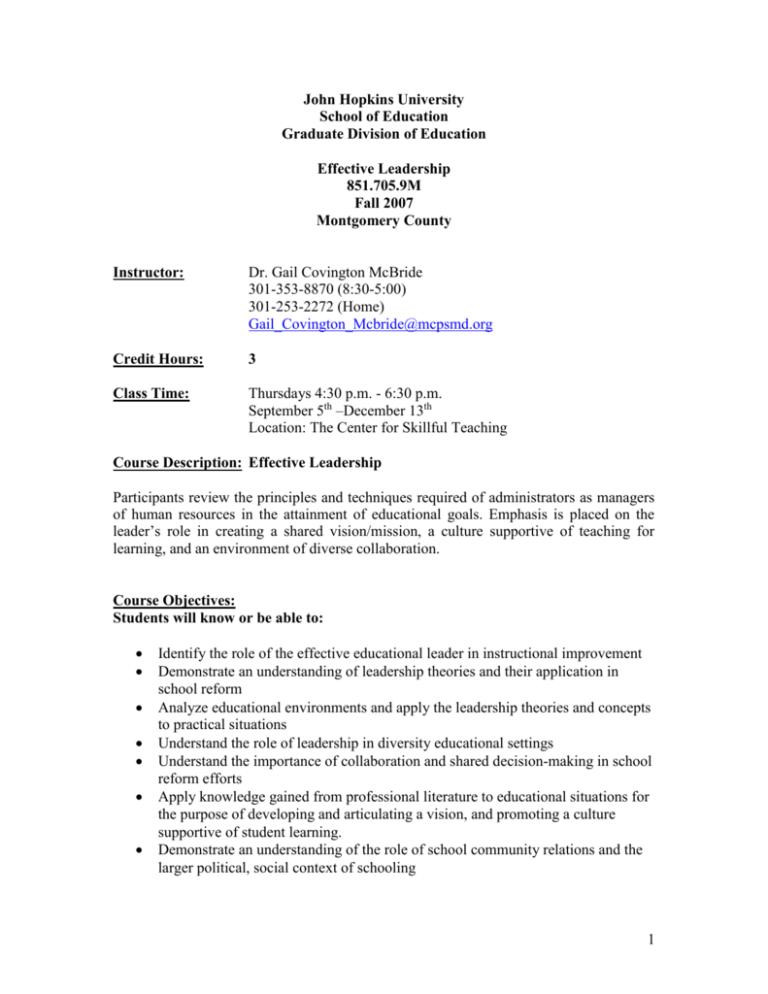
John Hopkins University School of Education Graduate Division of Education Effective Leadership 851.705.9M Fall 2007 Montgomery County Instructor: Dr. Gail Covington McBride 301-353-8870 (8:30-5:00) 301-253-2272 (Home) Gail_Covington_Mcbride@mcpsmd.org Credit Hours: 3 Class Time: Thursdays 4:30 p.m. - 6:30 p.m. September 5th –December 13th Location: The Center for Skillful Teaching Course Description: Effective Leadership Participants review the principles and techniques required of administrators as managers of human resources in the attainment of educational goals. Emphasis is placed on the leader’s role in creating a shared vision/mission, a culture supportive of teaching for learning, and an environment of diverse collaboration. Course Objectives: Students will know or be able to: Identify the role of the effective educational leader in instructional improvement Demonstrate an understanding of leadership theories and their application in school reform Analyze educational environments and apply the leadership theories and concepts to practical situations Understand the role of leadership in diversity educational settings Understand the importance of collaboration and shared decision-making in school reform efforts Apply knowledge gained from professional literature to educational situations for the purpose of developing and articulating a vision, and promoting a culture supportive of student learning. Demonstrate an understanding of the role of school community relations and the larger political, social context of schooling 1 The ISLLC Standards to be addressed in this course A school administrator is an educational leader who promotes the success of all students by: Facilitating the development, and articulation, of a vision of learning that is shared and supported by the school community; Advocating, nurturing, and sustaining a school culture and instructional program conducive to student learning and staff professional growth; Collaborating with families and community members, responding to diverse community interests and needs, and mobilizing community resources Understanding, responding to, and influencing the larger political, social, economic, legal, and cultural context. The MILF Standards to be addressed in this course Facilitate the Development of a School Vision Align all Aspects of a School culture to Student and Adult Learning Engage all Community Stakeholders in a Shared Responsibility for Student and School Success Classroom Accommodations for Students with Disabilities Our school is committed to providing an effective learning environment for students with disabilities. The School of Education (SOE) Disability Services office is available to all students requesting accommodations during their course of study. If you are a student with a documented disability who requires an academic adjustment, auxiliary aid, or other similar accommodation, please contact Karen Salinas, coordinator for the Disability Services office at 410-516-9823 or email ksalinas@jhu.edu. If you require any special accommodations to this course, please bring them to my attention at the beginning of the semester. Course notes, handouts, syllabus, lectures, and resources are available electronically. Statement of Diversity and Inclusion Johns Hopkins University is a community committed to sharing values of diversity and inclusion in order to achieve and sustain excellence. We believe excellence is best promoted by being a diverse group of students, faculty and staff who are committed to creating a climate of mutual respect that is supportive of one another’s success. Through its curricula and clinical experiences, we purposefully support the University’s goal of diversity, and in particular, work toward an ultimate outcome of best serving the needs of students in diverse K-12 schools. Faculty and candidates are expected to demonstrate an understanding of diversity as it relates to planning, instruction, management, and assessment. 2 Required Texts and Other Materials Dufour, R., Dufour, R., Eaker, R. (1998). On common ground: The power of professional learning communities at work. Bloomington, IN: National Educational Service. Fullan, M. (2001) The new meaning of educational change, 3rd edition, Teachers College Press, NY. Heifetz, R., Linsky, M. (2002). Leadership on the line, Harvard Business School Press The Jossey-Bass reader on educational leadership, (2000). San Francisco, CA: JosseyBass. Marzano, R., Waters, T., McNulty, B., (2005) School leadership that works, Alexandria, Virginia: ASCD. Schein, E. (1992). Organizational culture and leadership, 2nd edition, Jossey-Bass. Zeleznik, A. (2007). Management and Leadership: Are they Different? Harvard Business Review on Leadership Wheatly, M. J. (1999) Leadership and the new science: Discovering order in a chaotic world, Berrett-Koehler. Evaluation and Grading Demonstration of meeting class objectives through discussion, book talk, papers and attendance/participation (20%) Case Study Analysis/Assessment Part #1 (20%) Case Study Analysis/Assessment Part #2 (20%) Case Study Analysis/Assessment Part #3 (20%) Case Study Analysis/Assessment Part #4 (20%) Grading Scale A AB+ B BC+ C F = = = = = = = = 91%-100% 88%-90% 86%- 87% 81%-85% 78%-80% 76%-77% 70%-75% 0-69% 3 Course Outline Class Dates 9-6 9-13 9-20 Objective Reading Assignment/ Activity Lecture and Discussion Demonstrate an understanding of leadership theories and their application in school reform Heifetz, R., Linsky, M. (2002). Leadership on the line, Harvard Business School Press (Parts 1 & 2) The Jossey-Bass reader on educational leadership, (2000). San Francisco, CA: Jossey-Bass. (Chapter 1- The Nature of Leadership) (Chapter 6- People and Organizations) Zeleznik, A. (2007). Management and Leadership: Are they different? Harvard Business Review on Leadership Fullan, M. (2001) The New Meaning of Educational Change, 3rd Edition, Teachers College Press, NY. 9-27 10-4 10-11 Apply knowledge gained from professional literature to educational situations for the purpose of developing and articulating a vision, and promoting a culture supportive of student learning. Dufour, R., Dufour, R., Eaker, R. Individual book talks and Heifetz, R., Linsky, M. (2002). discussion Kotter, J.P., (2007) Leading Change: Why Transformational Efforts Fail, Harvard Business Review Wheatly, M. J. (1999) Leadership and the New Science Discovering Order in a Chaotic World, BerrettKoehler. Marzano, R., Waters, T., McNulty, B. (2005). School Leadership that Works, ASCD. (Chapter 7) Assignment #1 Due 9/13 Without referring to any documentation write your understanding of School Z’s shared vision of teaching and learning. In person (not via email) ask another teacher and a student to tell you their understanding of the School Z’s vision and script what they tell you. Find the documentation of the school’s vision and compare it to the 3 views you collected. What are the results and what are the implications? Examine School Z’s leadership, both formal and informal. What theory of leadership is evident? Cite a specific example of evidence to support your assessment. 4 The Jossey-Bass Reader (Chapter 15-Eight Symbolic Roles of Leaders) Book Talks 1,2 10-18 10-25 11-1 Identify the role of the effective educational leader in instructional improvement 11-8 Understand the role of leadership in diversity educational settings 11-15 Understand the importance of collaboration and shared decisionmaking in school Schein, E. (1992). Organizational Culture and Leadership, 2nd Edition, Jossey-Bass Dufour, R., Dufour, R., Eaker, R. (1998). On Common Ground: The Power of Professional Learning Communities at Work. Bloomington, IN: National Educational Service (Chapters 1& 2) The Jossey-Bass Reader (Chapter 9-The Unheroic Side of Leadership: Notes from the Swamp) (Chapter 23, Principals, Shared Decision Making and School Reform) 10/18- Assessment, Part 1 & Part 2 Due Book Talks 3, 4 The Jossey-Bass Reader 11/8-Assessment Part 3 Due (Chapter 16- Gender and Race as Individual book talks and Factors in Educational discussion Leadership) The Jossey-Bass Reader (Chapter 13-The Manager as Politician) Book Talk 5 Heifetz, R., Linsky, M. (2002). Dufour, R., Dufour, R., Eaker, R Panel Individual book talks and discussion 5 reform efforts 11-29 12-6 12-13 Demonstrate an understanding of the role of school community relations and the larger political, social context of schooling Analyze educational environments and apply the leadership theories and concepts to practical situations Book Talk 6 Book Talk 7 Individual book talks and discussion Dufour, R., Dufour, R., Eaker, R. 12/13-Assessment Part 4 Due 6
